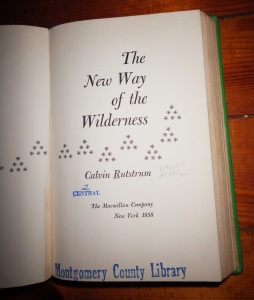Handbook for an Active Faith
In the news this weekend was the story of a man, Jon Kramer, who discovered two library books in his parents’ old cabin, both 40 years overdue. They were guidebooks that had helped the family develop a lifestyle around nature and an appreciation for the outdoors. Simple and practical books of great use and, apparently, great value, Jon decided to pay $1552.30 to cover the nickel-a-day late fees. Along with the check, he included a letter requesting to keep the books on loan with the promise of a similar payment after another 40 years.[1]  This story helps us understand why the New Testament book of James has continually been a favorite among Christians. First and foremost, James is a practical book. A book in which we can immediately see the need and put into use. A book scholar Robert Gundry calls “a manual of Christian conduct that assumes a foundation of faith.” (474)
This story helps us understand why the New Testament book of James has continually been a favorite among Christians. First and foremost, James is a practical book. A book in which we can immediately see the need and put into use. A book scholar Robert Gundry calls “a manual of Christian conduct that assumes a foundation of faith.” (474)
The first verse of James introduces us to a transformed life ready to spur other transformed people into actively living out their faith. The message of James is that genuine faith must become evident in how we live and what we do. Faith doesn’t sit the bench, there are no armchair Christians or couch-potato disciples.
So the question is, how is it going to be lived out? How will this guidebook help us to develop a lifestyle around active faith and an appreciation for not only hearing the Word, but doing it? If we hear God and become doers of His will, what will this mean for our church?
David A. DeSilva’s An Introduction to the New Testament, has an incredibly insightful list of which he says “the church that receives James’ word and takes it to heart will be characterized by the following traits.” For the sake of brevity I’ve summarized his list below:
- Our knowledge of God will shape our community.
- Our speech, actions and ambitions will be like Jesus.
- We will have a consistent witness through kindness and charity among ourselves and toward the world.
- We will resist the tendency to value people according to what they have, where they’re from or what they look like.
- We will welcome the poor and filthy along with the wealthiest donor.
- We will help members find healing for their strife.
- We will use the wealth and resources of our church to reflect God’s priorities instead of secular financial wisdom.
- We will seek to restore the sick and the sinner.[2]
I’m excited for what God has in store for our church as we engage with James between now and Easter. My hope is that we won’t keep our faith to ourselves, but we will get out there.
(Originally published at www.thatChristmaydwell.com)
[1] http://www.startribune.com/minneapolis-man-pays-1-500-late-fee-for-library-books-borrowed-in-1970s/408867025/
[2] David A. DeSilva, An Introduction to the New Testament, Intervarsity Press, England: 2004, p 839.
More in South Shores Blog
December 9, 2022
Ukraine Updates December 2022March 9, 2022
Ukraine UpdatesOctober 13, 2021
All People. Everywhere: Unhindered
Leave a Comment
Comments for this post have been disabled.